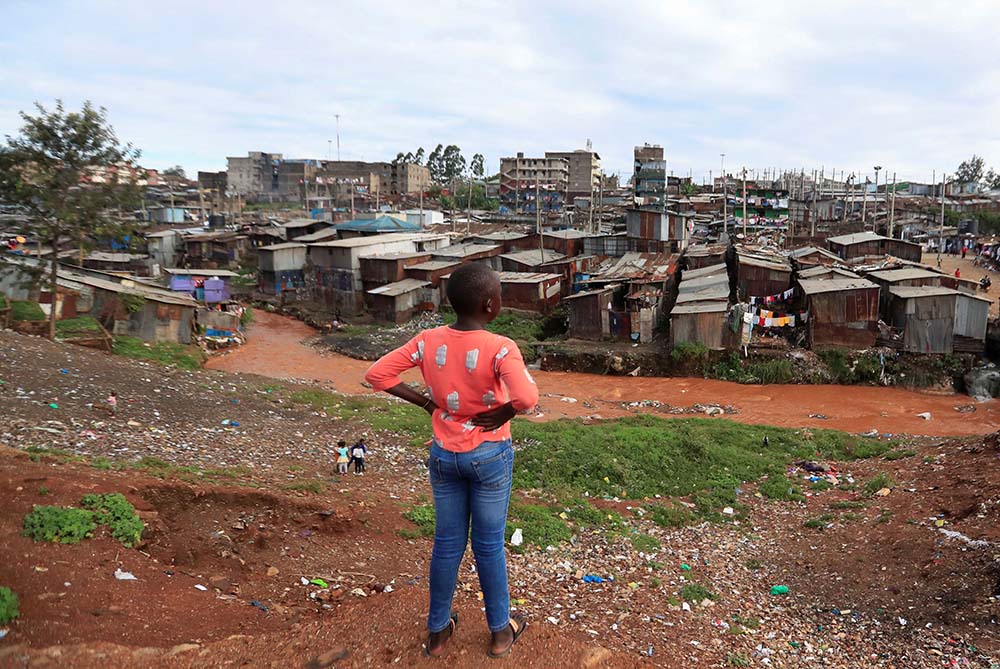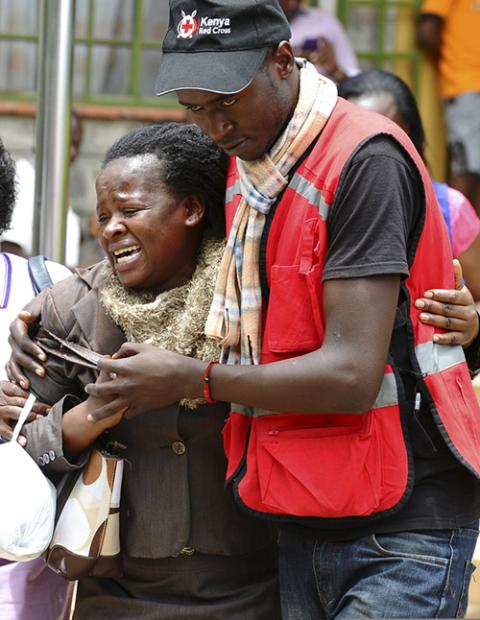
A young woman stands on a hillside looking over a poor section of Nairobi, Kenya, April 19, 2020, during the COVID-19 pandemic. (CNS/Reuters/Thomas Mukoya)
For most of my life, I thought there was some sanity in the world, but as I have reflected on some events, I have had to wonder what could have caused so much pain to humanity. For example, in the history of Kenya, there are so many painful experiences:
- In 1997, Kenya experienced extra ordinary heavy rainfall between May 1997 and February 1998 due to the El Niño phenomenon, which caused landslides and floods.
- On Aug. 7, 1998, there was a United States Embassy bombing in which 213 people died in Nairobi and 11 people in Dar es Salaam and thousands were injured. This was attributed to al-Qaida and the Egyptian Islamic Jihad.
- On Sept. 21, 2013, there was the Westgate shopping mall shooting where 71 people lost their lives.
- On April 3, 2015, there was the Garissa University College attack where 148 people died and 79 were injured. This was attributed to al-Shabab, which targeted students.
- The terrorist attacks in Kenya from 2011 to 2014 were terrible. For example, on May 16, 2014, terrorists attacked the Gikomba Market in Nairobi, where 10 people were killed.
Since becoming independent, Kenya has struggled with poverty. A third of our citizens are living on less than the U.S. equivalent of $1.90 per day. Every person wants to have the basics of life and avoid borrowing or stealing — and hence losing respect and dishonoring God. Nobody wants to live in extreme poverty, but it is here with us and has been here for a long time.
What is unclear is why there are still the "haves" and the "have-nots" in any given community, since God created everything good and wished that we might enjoy all his creation.
Advertisement
In this present era of COVID-19, Kenya has experienced rampant domestic violence, which has resulted in the murder of one or both of the spouses, and sometimes even the children. Friends and lovers are not an exception in this dreadful wave of violence.
My personal reflection is highlighted by the words of the Scriptures in Genesis 1:31: After God completed his work of creation — in the words of the African Bible — we read "God saw all He had made, and indeed it was very good." God had created heaven and earth and separated light from darkness and named them day and night. He then created all the vegetation and all living creatures that dwell on earth. These included birds of the air and animals.
Finally, God made man and woman and blessed them. At what point did all their greatness seem to diminish, all the blessings vanish from God's people? What could have made the friend of God and friend of man change into an enemy? Is there hope of change for the better? Better still — is there a possibility for restoration?
Through our mind's eye, you and I look out at the reality of ourselves, other people, life, the world and God in our own ways. We see things differently. Your vision of reality is not mine, and mine is not yours. Both of our visions are limited and inadequate but not to the same extent. We interpret and distort reality uniquely — hence the display of variant behaviors in life, from gentleness to violence.
Among all the gifts with which God has endowed man/woman is the gift of freedom. We are at liberty to choose life or death, right or wrong, good or bad, and God respects our decision.

A Red Cross worker assists a grieving relative April 3, 2015, as bodies of Garissa University College students killed the previous day arrive at a mortuary in Nairobi, Kenya. Al-Shabab militants raided the campus, leaving at least 147 dead. (CNS/Reuters/Herman Kariuki)
Reflecting on this, I think that the level of education, the quality of personal experiences, and the willingness to learn are contributing factors to whether a person becomes productive or destructive. For a person to accept what cannot be changed requires that they realize that there are some natural catastrophes for which there is no answer — except in the mind of God. A natural disaster like Kenya's experience with El Niño cannot be understood by most of us. But our lack of understanding does not change the fact that what God created was very good.
Every human person yearns for happiness. The terrorists are also searching for happiness in their own ways, even in their deadly missions where they leave many dead or maimed. The difference is that they search for happiness in a negative way, ending other people's lives as they strive to receive recognition and fame for having conquered another nation.
I was surprised to learn that violence happens even in birds! When two lovebirds meet — and after courting for some time agree to "tie the knot" and settle in a committed relationship — I would never in my wildest dreams have thought that one day either of the two would actually butcher the other like one killing an animal in a slaughterhouse.
Again, in their pursuit for happiness, one or both human partners might have strayed and abandoned their marriage for another lover, a reason that may have been the cause of many domestic violence deaths in Kenya.
In conclusion, in Romans 8:18-21, we read that any present sufferings are as nothing compared with the glory to be revealed for us. From his own life experiences, St. Paul knew what suffering means in the true sense of the word. This passage should be a source of encouragement to anybody undergoing hardships, both natural and manmade. It strengthens me to know that the difficulties and challenges I encounter in my life are only temporary and that we will share in the glorious freedom of the children of God. What could be more assuring than these words coming from God through his servant, the great apostle Paul?
So despite all that distresses us, God has plans of restoring his creation at the appropriate time. It is so true that God is faithful to his promises, since he said that everything he created was very good — and so it is.







